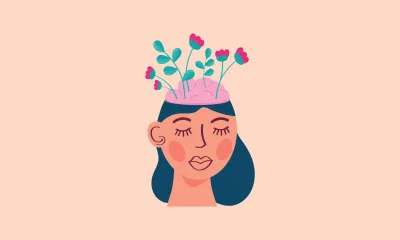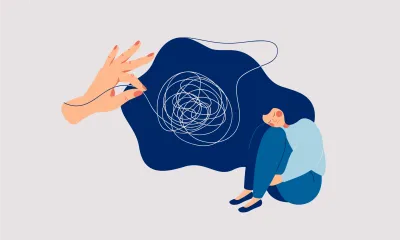All it takes is watching a quick snippet of the nightly news or scrolling through your social media feeds for a few minutes to see that everyone is stressed these days. In fact, the American Psychological Association has said that stress is causing a national mental health crisis in America.
Many people wish they could reduce their stress levels. However, the majority of them don't know how to do this.
Whether you are experiencing psychological symptoms related to stress or see stress impacting your physical health, there's a way to deal with it. You just need to learn how mindfulness stress reduction works and how you can implement it in your daily life.
Things to know
- Mindfulness-based stress reduction (MBSR) is a therapy in which a trained instructor leads people in weekly mindfulness activities such as meditation, yoga, or paced breathing to help reduce stress levels.
- MBSR aims to help you view your thoughts and feelings in a calm, non-judgmental way, which can help reduce worrying and lower stress levels. It's often used alongside other types of therapy and/or medication.
- Regular mindfulness practice can help reduce stress by increasing awareness of thoughts and emotions, increasing focus, lowering reactivity to negative emotions, connecting with the body, and raising compassion levels.
The great news is there's still more to explore. Here's what this article covers:
- What Is Mindfulness Stress Reduction?
- Positive Effects of Mindfulness
- How Can You Use Mindfulness To Manage Stress?
What Is Mindfulness Stress Reduction?
Mindfulness-based stress reduction (MBSR) is a specific type of therapy in which a trained instructor leads people in weekly mindfulness activities, such as meditation, yoga, or paced breathing. The idea is that, through these classes, people will learn how to use mindfulness exercises to reduce their stress levels.

Mindfulness-based stress reduction aims to help people view their thoughts and feelings in a calm, non-judgmental way. This can help reduce worrying and lower stress levels. However, people usually use MBSR alongside other types of therapy and/or medication.
People who live with an anxiety disorder, depression, or other psychiatric disorders benefit from mindfulness stress reduction therapy. People with high blood pressure, chronic pain, and chronic illness also find it helpful. And, of course, anyone who experiences chronic stress or needs stress management help can participate in MBSR.
A typical MBSR program offers weekly classes that last between two and three hours. A trained instructor shows participants a new mindfulness technique each week, and then everyone practices the exercise as a group.
Some relaxation techniques you might learn in a class include:
- Paced breathing exercises
- Guided meditation
- Yoga poses
- Journaling, particularly mindful journaling or gratitude journaling
These exercises teach you how to focus on the present moment and worry less. This helps you maintain calm even when something stressful happens. Many people say that the sessions have a positive effect on their physical and mental health.
Most people attend classes with an MBSR instructor for eight weeks. After this, you can take the techniques you learned and practice them at home. The more you practice these skills in your daily life, the better you will feel.
Positive Effects of Mindfulness

Mindfulness techniques aren't just silly things college students do to help them focus. Studies have shown that regular mindfulness practice can help reduce stress for nearly everyone. These are just some of the ways in which mindfulness reduces stress:
1. Mindfulness makes you more aware of your thoughts.
Through mindfulness practice, you develop a new awareness of your thoughts and emotions. You learn to look at them from a fresh perspective and let go of them. This heightened awareness can help you recognize stressful situations sooner so you can deal with them before they consume you.
2. Mindfulness increases your focus.
Meditation and other mindfulness techniques require a high level of focus and attentiveness. When you practice these skills regularly, you will likely notice that your ability to focus at work and home is much better than it was before. In many cases, this can help lower stress levels.
3. Mindfulness lowers your reactivity.
Psychologists have found that mindfulness practices can influence the amygdala and other areas of the brain responsible for stress responses and emotional reactivity.
In other words, lowering your psychological distress reduces your emotional reactivity. This means negative emotions don't affect you the way they once did. You may also find that you can "take a step back" before responding to a stressful event or person.
4. Mindfulness helps you connect with your body.

Mindfulness not only teaches you to relax but also helps you build a better connection with your physical body. You learn to recognize certain bodily sensations, control your breath and muscles, and focus on specific body parts.
Connecting with your body in this way can help you learn how to pace your breathing, release muscle tension, and even lower your heart rate. This can help reduce your stress levels and make you feel better physically.
5. Mindfulness raises your compassion levels.
When most people think of mindfulness training, they think about how the techniques help you connect with yourself. However, this mindful awareness also translates into our relationships with others.
In other words, regular mindfulness meditation can help boost your awareness of others' emotions and help raise the level of compassion you feel towards others.
How Can You Use Mindfulness To Manage Stress?
Although a stress reduction program like MBSR can be great, it's not the only way you can mindfully manage your stress. You can do several things throughout the day to practice mindfulness, care for your body, and reduce your stress levels.

To make an activity a mindfulness practice, you must ensure you're 100 percent focused on the task or activity you're doing. Also, it helps if you try to engage as many of your senses as possible or physically do something with your body that you can focus on.
You may notice your thoughts try to take over, and that's okay. Acknowledge thoughts as they enter your mind, then refocus your attention. This helps avoid rumination, which can increase your stress levels.
Although any activity can become a mindful one, here are some suggested mindful ways you can manage stress throughout your day.
1. Involve the five senses in your morning routine.
Mindfulness often engages all your senses, and your morning routine helps you start the day on the right foot. So, why not engage your senses throughout the process. You can do this in the shower, while you sip your coffee, or while you head out on a morning jog. Pay attention to the sights, smells, and sounds around you — they will naturally relax you.
2. Read daily affirmations.
Affirmations help you overcome negative thoughts. They can also serve as a sort of meditative chant if you repeat them to yourself throughout the day. They're an easy way to mindfully reduce your stress levels, and it's something that doesn't cost any money.
3. Set aside time to meditate at least once each day.
One of the best ways to reduce stress levels is by making time for your mindfulness practices in your daily schedule. Even short, five-minute meditations can lower stress levels and calm your mind. The more time you set aside for this practice, the more it will pay off.
If you aren't sure how to meditate outside of weekly sessions with a guide, try out some guided meditations available online. You can even use apps like Calm or Headspace to help guide you.
4. Use paced breathing techniques to calm your body.
Numerous paced breathing exercises exist, but they all offer the same thing. Anytime you focus on your breath and control it in regular intervals, you help cue your parasympathetic nervous system to calm any psychological distress you're experiencing.

Also, most people can't see what you're doing when you practice paced breathing. This means you can use it "in the moment" when you're feeling the effects of psychological stress. Just a few minutes of square breathing makes significant reductions in your stress.
5. Leave your desk during lunch.
Many of us eat lunch at our desks because we think it will help us remain productive. However, stress and mental fatigue settle in throughout the day, and we need mental breaks to boost our productivity.
Mindful eating is just as important as any other form of mindfulness. When we mindfully eat, we take in the amount of food our body needs. We also enjoy the smell and taste of our food as we eat slowly with purpose. It also gives our brain a break from multitasking, which reduces stress even more.
So, make time to leave your desk for lunch if you can. Even better, take your lunch outside if the weather is nice and focus on what's around you.
6. Reframe negative thoughts.
Even those with many inner resources for mindfulness experience negative thoughts from time to time. We're human, and sometimes our brains feed us crap — it happens. However, the sooner we catch those negative thoughts and reframe them, the better off we are.
You can reframe negative thoughts with positive affirmations or reword the thought in a less negative way. Just make sure you catch the thoughts and take the time to change them before your brain starts believing them.
7. Take short walks throughout the day.
We all know that walks are beneficial to our physical health. However, if we take the time to go on mindful walks, they can also be great for stress management and mental health.
To take a mindful walk, you pay attention to the sights, sounds, and bodily sensations you feel while walking. The goal here isn't to break a sweat or workout — you just want to reconnect with yourself and live in the present moment.
Oh, and don't forget to silence your smartphone so you can enjoy the full benefit of a mindful walk.
8. Establish a relaxing bedtime routine.

Believe it or not, a relaxing bedtime routine can also serve as a great mindfulness technique that helps with stress reduction. You need to plan out a schedule of tasks you'll complete in order each night before you go to sleep. This cues your body to relax and helps your mind prepare for sleep.
For many people, a consistent bedtime routine includes brushing teeth, taking nightly vitamins or medications, and putting on pajamas. It can also include meditation, relaxing stretches, or reading a book.
As you complete each task, pay close attention to your thoughts, feelings, and bodily sensations. Think about each step in the routine as you do it without thinking about what comes next. Also, turn off electronics and dim your lights because this helps promote sleep.
Take Control Over Your Stress
Stress doesn't have to control your life. You possess many of the tools you need to manage your chronic stress and reclaim your life.
You can try using an MBSR course to help you master mindfulness techniques that relieve stress. Or, you can read about mindfulness techniques and teach yourself the skills you need to get your stress levels back under control.
Just remember, mindfulness stress reduction is a process that takes time to master. If you are patient with yourself and keep trying, though, you will absolutely notice a difference in your health over time.









